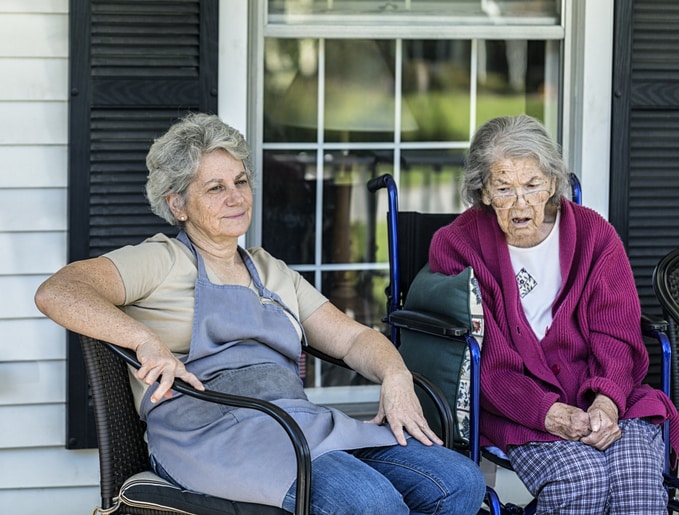By Jackie Tangiers, LCSW-C, CCM, and
Elaina Thomakos, Care Communication Liaison
Being a caregiver to someone you love is more difficult than people think. It can take a toll on your physical and emotional health, perhaps leading to “burnout”. You can ease the burden and improve the situation by recognizing and tapping into the many and varied resources in your community.
What is Caregiver Burnout
Caregiver burnout is a state of overall exhaustion resulting from caregiving responsibilities, particularly if a caregiver is trying to overextend themselves physically or financially. Other emotions associated with caregiver burnout can include guilt and frustration. Guilt can arise when a caregiver feels that they are not doing everything they can to help their loved one, or when they take time for themselves away from their caregiving duties. Frustration results when caregivers feel that they are not receiving help from those around them, or when they feel that they are not able to give their loved one the quality of care that they need.
What are the Causes of Caregiver Burnout?
- Being forced into the role of caregiver.
- Caregivers neglecting their own mental and physical health.
- Setting unrealistic expectations for themselves and the care they are providing.
- Inability to separate their role as a caregiver from other aspects of life.
- Feeling powerless and not in control of the care their loved one is receiving.
What are the Symptoms of Caregiver Burnout?
- Withdrawal from other aspects of life.
- Changes in eating and sleeping patterns.
- Feeling hopeless.
- Depression and irritability.
- Resentment of the person being cared for.
- New or worsening health conditions.
- Substance abuse.
How Can I Prevent Caregiver Burnout?
Taking steps to prevent caregiver burnout is necessary to promote the health of the caregiver and the person they are caring for. An important step to take is establishing a support system comprised of family members, friends, and professionals to aid in the process of caregiving. These are people that a caregiver can go to simply to talk to and express their emotions with, or that can provide vital resources for easing the stress of caregiving.
Making time in a busy schedule for a caregiver to take care of their overall wellbeing can be an essential part of preventing major symptoms that result from caregiver burnout, including depression and extreme fatigue. It may be hard for a caregiver to prioritize their health when the focus is usually on the health of the person they care for, but taking the time to do things like eating right, getting enough sleep, and taking breaks from caregiving can improve the quality of life for both the caregiver and their loved one.
Resources for Caregivers
Caregiving is not something that people have to navigate alone. There are various kinds of resources for caregivers that can aid them with solving any issues they may be having, or simply provide them with a listening ear. Support groups comprised of other caregivers are available both in-person and online, making it easy to get in touch with people that may be going through similar struggles.
Other services available to help ease the burden of caregiving include home health services, adult day care programs, and home care aides, and certified geriatric care managers. Care managers are knowledgeable resources on providing high-quality and personalized care for your loved one. Care managers can coordinate various aspects of your loved one’s care, such as providing education on care options, navigating through the healthcare system, budgeting and legal services, and more.
How to Locate a Support Group
There are disease-specific support groups sprinkled throughout most communities. For instance, Multiple Sclerosis, Stroke, Diabetes, and the Alzheimer’s Association support groups. Along with these, you could find a support group just for caregivers.
We suggest you contact your Area Agency on Aging, local hospital community outreach/education department, your doctor’s office, and of course, search the internet. Other ways are a simple word of mouth, asking family, friends, and neighbors. You will be amazed at how many resources are out there that you did not know of!
Finally, we are providing the contact numbers for the Maryland Access Point (MAP) for your county. MAP is the Aging and Disability Resource Program in Maryland, designed to assist individuals with long term care needs and their caregivers identify and locate services in their community.
- Allegany: 301-783-1752
- Anne Arundel: 410-222-4257
- Baltimore City: 410-396-2273
- Baltimore: 410-887-2594
- Calvert: 410-535-4606
- Caroline, Kent, Talbot: 410-778-6000
- Carroll: 410-386-3800
- Cecil: 410-996-5295
- Charles: 1-855-843-9725
- Dorchester, Somerset, Wicomico
410-742-0505, ext. 109
- Frederick: 301-600-1234
- Garrett: 301-334-9431
- Harford: 410-638-3025 ext. 2521
- Howard: 410-313-5980
- Montgomery: 240-777-3000
- Prince George’s: 301-265-8450
- Queen Anne’s: 410-758-0848
- St. Mary’s: 301-475-4200 ext. 1057
- Washington: 301-790-0275
- Worcester: 410-632-9915
It can be hard to let go of the control of caring for your loved ones. However, everyone’s health and well-being are improved when you are feeling better. Take care of yourself. Ease your burden of caregiving and bring a healthy balance back into your life.
If you or someone you care about needs additional support to help cope, The Option Group is here to help. Please contact our professional care management team for assistance.
About The Option Group: Founded in 2010, The Option Group’s compassionate team of experienced Certified Life Care Managers serves families, their loved ones, medical professionals, and professional family advisors in Maryland, Pennsylvania, and Delaware. The firm understands the challenges of caring for an individual who needs assistance due to aging, dementia, disability, or serious illness. Their skilled providers possess over 100 years of combined experience navigating the healthcare maze and accessing hundreds of quality resources. The Option Group helps families spend quality time with their loved ones, providing clear choices that lead to better care. For more information, visit www.theoptiongroup.net or call 410-667-0266 (MD) or 717-287-9900 / 610-885-8899 (PA) / or 302-858-6449 (DE).

